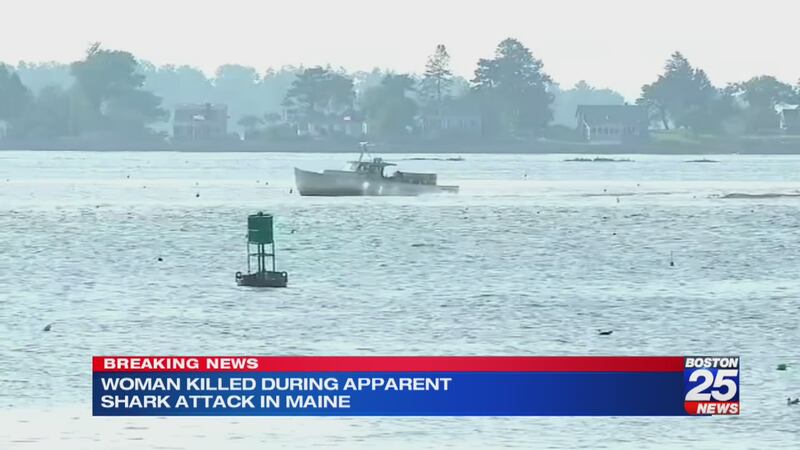HARPSWELL, Maine — A woman died Monday following an apparent shark attack in Harpswell, Maine, the state’s Department of Marine Resources said in a release.
On Tuesday, the Maine Department of Marine Resource identified the woman as Julie Dimperio Holowach, 63, of New York City.
The attack happened off the coast of Bailey Island near White Sails Lane in the town.
The woman, last seen swimming in the waters off the coast of Harpswell, was pronounced dead on shore after she was rescued by witnesses who had been kayaking nearby, in the rocky collection of islands and peninsulas northeast of Portland.
“It is the only confirmed fatality in Maine waters from a shark attack,” said Department of Marine Resources Commissioner Patrick Keliher said in a news release Tuesday. The only other confirmed shark attack in Maine waters occurred 10 years ago near Eastport, and that shark was reported to be a porbeagle.
The deadly encounter is now on the radar of Massachusetts shark expert Dr. Greg Skomal.
“What I’m super anxious to find out is some of the specifics about this case: How is it diagnosed as a shark attack? Where did it attack? How far off shore?” he said.
The incident happened at 3:37 p.m., according to the Coast Guard, prompting USCG officials to launch a rescue boat from south Portland. However, before rescuers arrived at the scene, two kayakers were able to reach the victim and help that person back to shore.
Once on land, local emergency medical services from Harpswell arrived and declared the victim dead at the scene, DMR said.
“Until further notice, swimmers and boaters are urged to use caution near Bailey Island and to avoid swimming near schooling fish or seals,” DMR said.
>>>MORE: Dorchester man, 43, dies after crashing Jet Ski into moored sailboat
Skomal, who has studied sharks of all kinds for three decades, is a specialist in the North Atlantic who is known for separating fact from fiction when it comes to shark attacks.
Factors such as the depth and temperature of the water could help narrow down the species of shark potentially involved, he said.
“There’s so few shark attacks that finding any kind of patterns is extremely difficult because we just don’t have the sample numbers, that’s a good thing,” Skomal said.
While attacks on humans are considered extremely rare, concerns here in Massachusetts have been validated in recent years, as Cape Cod has turned into the summer home of a growing population of white sharks.
In August of 2018, 61-year-old William Lytton suffered deep puncture wounds to his torso and leg after a shark clamped down on him on Longnook Beach in Truro.
Then just one month later, the state saw its first fatal shark attack since 1936 when 26-year-old Arthur Medici was attacked while boogie-boarding off Newcomb Hollow Beach in Wellfleet.
“The increase in the seal population is what these sharks are targeting,” Skomal said. “It’s important for everybody to understand that the probability of a shark attack is still remarkably low.”
Download the FREE Boston 25 News app for alerts on breaking news stories like this one.








